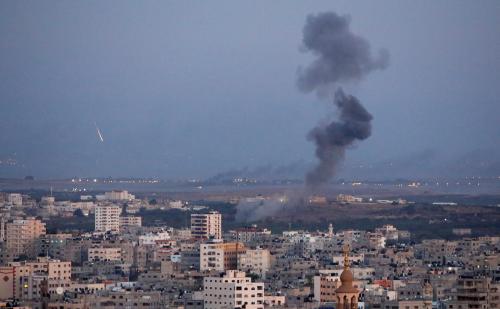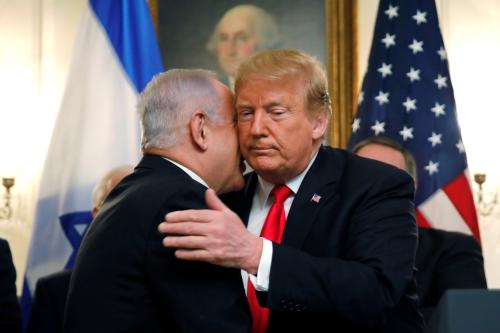Both Palestinians and Israelis have reasons not to escalate their latest conflict, writes Daniel Byman—though domestic pressures could cause the situation to spiral out of control. This piece was originally published in the Washington Post.
A ceasefire on Monday ended one of the worst rounds of fighting between Israel and Hamas since 2014. Four Israelis and more than 20 Palestinians died in two days of conflict, which followed a violent demonstration along the border fence that separates Israel and the Gaza Strip and the shooting of two Israeli soldiers. Palestinian militant groups fired almost 700 missiles into Israel, most of which landed harmlessly—but several struck homes or other targets in Israel.
Israel bombed hundreds of targets in Gaza, striking Hamas and Palestinian Islamic Jihad facilities and killing a military commander it claimed had links to Iran, resuming a practice of targeted killings it had put on pause. As always, responsibility for civilian dead is hotly disputed, but the Palestinians count two pregnant women and two infants among the dead.
The latest round of fighting between Israel and Hamas illustrates not only the constant potential for conflict in Gaza but also—perhaps more counterintuitively—why the combustible situation there has not exploded into outright war. Some Israeli citizens this week called on Prime Minister Benjamin Netanyahu to escalate the fight, and some militants welcome a broader clash. But both sides have reasons for restraint. Hamas leaders recognize their own military, political and diplomatic weakness; a longer war would achieve little and leave Gaza in even worse shape. And Israel, for its part, recognizes that a weak extremist regime in Gaza is better than the collapse of order in the strip or the rise of an even more radical group there. As Israeli security analyst Gabi Siboni pointed out, “If Israel collapses the Hamas regime, what comes after? Every alternative is awful.”
So Israel uses enough force to keep Hamas weak and to send a message that shootings and rocket attacks will be severely punished. But it restrains itself to avoid a full conflagration. On both sides, however, domestic politics and misconceptions could spur decisions that could cause the violence to spiral out of control.
The latest fighting was intense but should come as no surprise. Israel and Hamas clashed in 2008-2009, 2012 and 2014, resulting in the deaths of almost 100 Israeli soldiers and civilians and that of more than 3,000 Palestinians. Between 2014 and 2018, Israel regularly bombed Gaza to stop rocket attacks and punish Hamas—operations the Israeli military calls the “campaign between the wars.”
Hamas has long used or tolerated rocket attacks as a way to draw international attention to Gaza—and to Israel’s alleged failure to honor past agreements that would enable more economic activity and development on the strip. In addition, this time the group may believe that the timing was especially opportune, because Israel’s Memorial Day and Independence Day are coming up (on Wednesday and Thursday) and because in a week, Tel Aviv hosts the Eurovision song contest; Israel may have been more sensitive to disruption. More broadly, Hamas may seek to send the world, including the Trump administration, the message that no peace deal can happen without Hamas’s tacit approval.
Hamas governs Gaza ineffectively, which hampers its ability to gain leadership of the Palestinian cause. Israel and Egypt both maintain tight control over Gaza’s borders, and Hamas’s archrival in the West Bank—the Palestinian Authority—uses its ties to Israel and the international community to control money going into Gaza (and undermine Hamas). The resulting misery and stagnation in Gaza are one reason Hamas is willing to risk conflict: to show militants that it is standing up to Israel and let frustrated Gazans know that it will not meekly accept a grim status quo.
Yet the lack of an all-out conflict comparable to 2014 suggests that both sides are reluctant to escalate. Hamas’s rockets spread terror and some death, but they aren’t a winning military strategy, and the group was quick to press for a ceasefire. Israel’s tough but calibrated military response ended the barrage without upending the government in Gaza, and it provoked little international criticism (this time, at least).
In addition to its poor military options, Hamas is diplomatically isolated. Egypt’s leader Abdel Fatah al-Sissi, who has support from both Saudi Arabia and the United Emirates, has proved a bitter enemy, closing the Rafah border crossing and cracking down on the movement of arms and militants between Sinai and Gaza. The wars in Syria and Yemen (where Hamas and Iran back opposite sides) have frayed relations with Tehran, and although the two have reached a modus vivendi, Hamas has learned to expect little from Iran during a shooting war with Israel.
Restraint is hardly guaranteed, of course. Israel often conducts the “campaign between the wars” to send a message to its other regional enemies. Any weakness in the face of Hamas attacks, Israeli leaders fear, will embolden Hezbollah in Lebanon and Iran in Syria. Israel, however, must be wary of pushing Hamas too close to the brink.
Ironically, Hamas and Israel both have the same answer to Gaza’s troubles: the Palestinian Authority. From Israel’s point of view, if the Palestinian Authority took control of Gaza, the group could serve as a peaceful alternative to Hamas and an acceptable channel for international aid. Hamas, for its part, is eager to pass the hot mess that is Gaza off to the Palestinian Authority. However, Hamas will not surrender its weapons, as Israel and the United States demand, for fear of losing its “resistance” credentials and because it suspects that the Palestinian Authority would arrest and torture Hamas members (as it has in the past). The Palestinian Authority does not want Hamas to get back on its feet, and it recognizes that trying to bring prosperity to Gaza is a losing proposition.
Domestic politics on both sides are wild cards. Former Israeli chief of staff Benny Gantz, who almost unseated Netanyahu in the latest election, claimed the ceasefire was “another surrender to the blackmail of Hamas and terrorist organizations.” Hamas’s politics are less transparent, but hard-liners are likely to press for a more confrontational approach if the group continues to flounder. In addition, Hamas leaders face competition from even more militant organizations such as the Palestinian Islamic Jihad, as well as Islamic State-type radicals who reject all compromise.
The greatest source of Hamas’s strength is the political weakness of the Palestinian Authority, which grows ever more discredited as peace talks become a pipe dream. Serious proposals on settlements and a move toward a broader peace agreement would serve Israel well in the long term. But this won’t happen without prompting from Washington or a change in heart among the Israeli population and their leaders, neither of which seems likely.
For now, limited, sporadic conflict may be the best outcome we can hope for.
The Brookings Institution is committed to quality, independence, and impact.
We are supported by a diverse array of funders. In line with our values and policies, each Brookings publication represents the sole views of its author(s).








Commentary
Why Gaza hasn’t erupted into all-out war
May 10, 2019